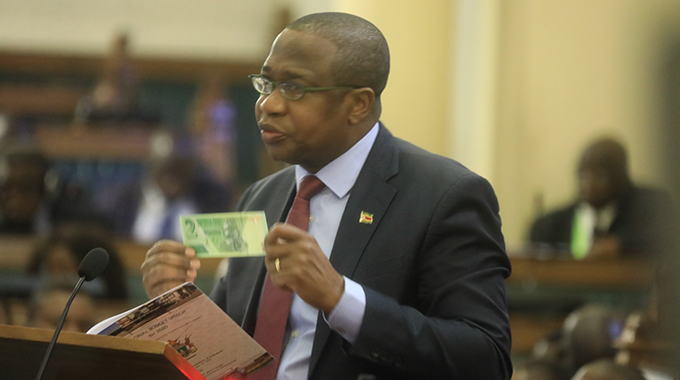Editorial Comment: Budget helps the ordinary person

Careful but caring perhaps describes best for the ordinary person the 2020 National Budget presented by Finance and Economic Development Minister Mthuli Ncube on Thursday, where he used the modest flexibility that his fiscal discipline and reforms have created to make life a bit easier and better for most.
In the run-up to the Budget, there were the usual wish lists, with everyone wanting lower taxes, or even better no taxes for the particular group or sector they fell in, and vast increases in Government spending.
This is the sort of thing the minister, as a technocrat, was brought in to stop. And he was not even tempted.
But in his first year, he imposed the discipline of ensuring the Government spent on salaries and other day-to-day expenses only what it earned in taxes and he has put in significant effort, amid a lot of screaming, to hunting down hidden subsidies and market distortions and removing these.
The result is, despite a very difficult year economically, and one made worse by disasters like drought and Cyclone Idai, he can now see and present a clearer picture of the economy and the fiscus.
This meant that he could finally do certain things a lot better when he fulfilled Government policies of trying to protect the poor and help the ordinary wage earner.
He can calculate precisely the costs of these interventions, calculate the benefits and can even with the crude tools he still has to use, direct his careful, transparent and budgeted subsidies to at least the groups that need them. There are also promises of further refinement so that eventually only the individuals and families who need help get that help.
Wage earners were interested in his reform of tax brackets, including his special zero-tax bracket for bonuses. Here he simply factored in inflation, or more precisely what he reckoned inflation might reach before he has to intervene again. And it should be noted that he used inflation to measure loss of value, not the exchange rates that the economically ignorant keep asking for.
This seems obvious, but there are still people who like to calculate income and expenditure in US dollars using an exchange rate that has very little to do with real value and a lot more to do with the side-effects of greed, fear, manipulation and ignorance.
He also, interestingly considering his efforts to control consumption, is putting through a small cut in VAT.
But that 0,5 percent cut in prices is not likely to trigger a wave of spending and in any case will be absorbed with a few days of monthly inflation at present rates. Where it will help is making businesses a little more viable, and so a little more able to meet wage bills and the like. For a business, an extra $5 000 on $1 million of sales is at least enough to add one or two people to the payroll.
Where the vulnerable now win is the switch in the way subsidies are thought through and targeted.
Zimbabwe was spending millions of dollars on a strange system of subsidies by getting the Reserve Bank of Zimbabwe (RBZ) to use a much lower exchange rate for importers of what were listed as essential goods and services, such as petroleum fuels, wheat and maize. Someone had to pay the difference, and that someone was the Zimbabwean taxpayer, although the source was never listed.
Now it is listed, and the subsidies are carefully costed and budgeted. One of the first of the new breed was the Zupco subsidy, which absorbed a portion of the excise duties on fuel, which was properly costed at market rates. This only benefits those wishing to use public transport. And unlike the hidden fuel subsidy, which resulted in illegal exports to the region, it cannot be abused by the wide-boys seeking instant wealth. But it does get more workers to work to earn a living.
The system is to be extended to basic food as wheat and maize importers are told to go to the interbank market to buy their foreign currency.
Roller meal and the “standard loaf” will be subsidised, but not fancier products of the millers or the more profitable products of bakers.
And it will be a lot harder again to smuggle subsidised products across a border.
Who, for a start, wants a truckload of stale bread? The move also removes a lot of corruption opportunities and temptation from GMB employees.
And Prof Ncube was interested in that aspect, a major plank of President Mnangagwa’s Government.
While hunting down the corrupt continues, despite the delaying tactics of lawyers, it is much easier if people do not cheat or steal in the first place.
Many of the minister’s reforms remove the arbitrage opportunities for corruption, and as he wants the Auditor-General to assume an ever more prominent role, the Government is moving towards the sort of controls that most private businesses find essential.
Social spending has not been forgotten. There are two aspects here. The first is helping the vulnerable, those who cannot with the best will in the world, help themselves. That is increasingly targeted to the actual households involved rather than being spread to everyone.
The second area of help targets those who can help themselves, but simply need to be given opportunities to earn a living. Here the minister was more expansive.
His measures ranged from backing small income-generating schemes in poor communities to managing agriculture input schemes and Government investment in infrastructure.
This, along with the policy of hiring workers from local communities, is already making a difference. Added to that are special tax concessions to businesses that hire and train young people and bring them into the formal skilled economy.
There are no magic wands to create economic growth and to spreading the opportunities for new wealth. But Prof Ncube has put together a raft of policies, and found some funding for these, that together can make a difference, and especially a difference for those wanting to work and wanting to get ahead.
So in the end, the minister is working towards making life easier for those with income, and helping those without to start earning. It seems a sensible combination.








Comments